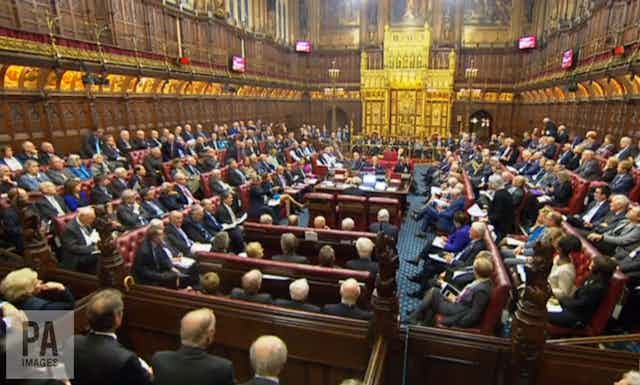The ongoing Brexit debate has focused a great deal of attention recently on the House of Lords. Rumblings about reforming or even abolishing the second chamber have been heard for years – and those in favour of such a radical change have been spurred by an impression amplified lately that the House of Lords is obstructionist.
The heat with which the Brexit debate is being conducted has fostered a mantra that the Lords is an unelected body that nonetheless controls national decisions. But a question for the country must then be whether the function of the Lords is being correctly understood – or deliberately misunderstood.
Amid the tension over this matter, language becomes hyperbolic – which can sometimes obscure the important issues. For instance, the government is never “defeated” by the Lords, as was reported when peers voted for an amendment to the bill enabling the government to trigger Article 50 to begin Brexit negotiations.
The second chamber amends a bill so that it cannot operate as law exactly as the government wishes because it finds that the proposal is flawed. The government’s ambitions are not “thwarted” – it is simply asked to think again. When things do not go your way, is it always a reasoned response to seek to eradicate that which stands in your way?
The UK has a progressive, radical government with an intense and urgent programme of reform, so passing bills unimpeded in the second chamber would be expedient. When this does not occur, the government is frustrated: its programme is thrown back. The pressure is particularly intense for the Article 50 bill. It has set itself a March deadline for this and does not want to delay.
So then people are encouraged to think that the House of Lords exceeds its authority. This is unjustified – and is born more out of an impression of its obsolescence and loftiness than anything concerned with its constitutional role.
The question then is one of whether peers are villains of the piece or whether their Lordships are exercising wisdom and reason in scrutinising the legislation proposed by the government and then improving it – like good fairies.
Two houses at odds
The Brexit bill has generated unaccustomed high drama. The Lords have tabled a large number of amendments to the bill. Here one might well question whether they are acting as villains or as the voice of reason. Amendment 9b was critical, concerning the rights of EU citizens to remain in the UK after it had left the Union.
By introducing what must be the ultimate open-textured bill, consisting of only one substantive clause, the government hoped to expedite its passage. Importantly, it felt also that it should not reveal its negotiating hand before triggering Article 50. But the Lords wanted to see the conditions of leaving on the face of the bill. The amendment was agreed to, though, and the bill passed back to the House of Commons.
Reforming the Lords
Whither Lords reform now? The wisdom of the assembled peers is no fiction. It would be foolhardy to dispose wantonly of what is good. The phrase associating babies with bathwater comes to mind.
Nonetheless, the house itself has seen the writing on the wall: its size and constituency is roundly criticised, contributing to accusations of absurdity, inefficiency and cost. Previous prime ministers have fed this impression by making multiple appointments of new peers, creating an unwieldy institution.

There are various options for reducing the size of the house, thus making it more efficient. Age-related retirements could be introduced, or fixed-term appointments. Voluntary withdrawal could be allowed and participation more closely scrutinised. Parliamentary committees and select committees are contemplating these.
The Lords do not despise the idea of reform. Crucially, they are instigating it themselves – but incrementally and without drama. Their characterisation either as political villains or the collective repository of reason will continue to be a matter of preference – but they hope in future to deflect censure with business continuing as normal.

